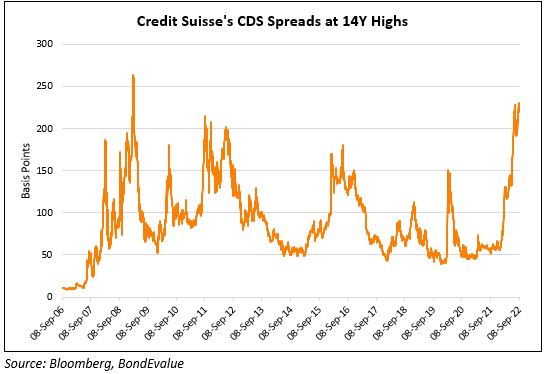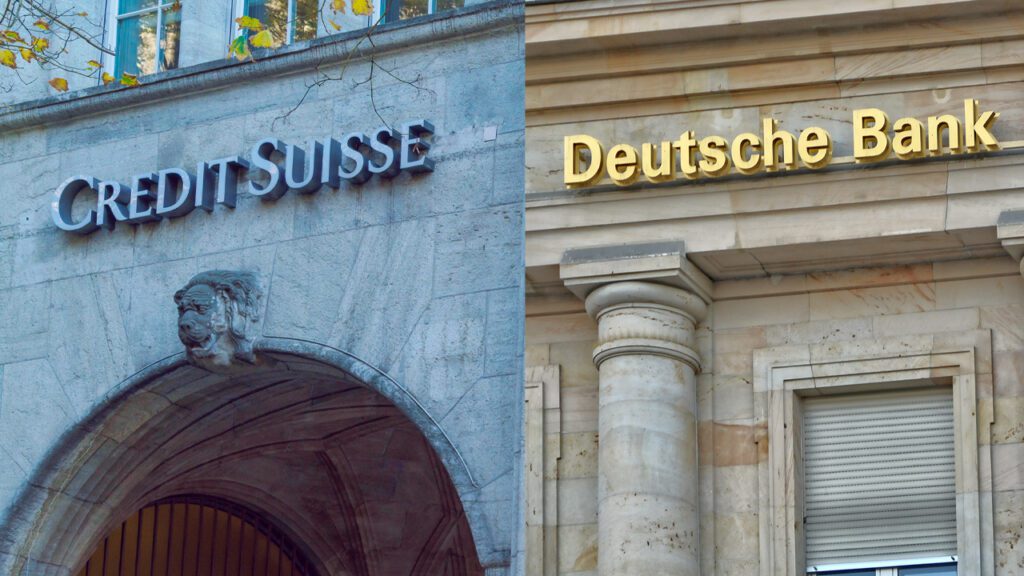
It’s been more than a decade since the financial crisis in 2007-2008 when Lehman Brothers, the fourth largest investment bank in the U.S., collapsed and filed bankruptcy. Close to 14 years later, Credit Suisse and Deutsche Bank, two of the world’s largest banks, are suffering from distressed valuations and the banks’ credit default insurance levels are approaching degrees not seen since 2008.
Credit Suisse and Deutsche Bank Valuations Have Dive-Bombed — Investors Discuss the Systemic Risk to the Global Economy
During the first week of October, the world economy continues to look bleak as energy and gas prices have reached record highs, inflation in many countries is the highest in 40 years, supply chains are fractured, equity markets have shed significant value, and the tensions between the West and Russia has elevated.
Amid this nasty economy, two of the largest investment banks are floundering from distressed valuations. Market data shows that Credit Suisse Group AG (NYSE: CS) and Deutsche Bank AG (NYSE: DB) are trading at extremely low values not seen since the 2008 financial crisis.
At the end of August, Deutsche Bank analyzed the issues tethered to Credit Suisse, and the bank’s analysts noted that there was a $4.1 billion gap that needs to be filled in order to combat the financial institution’s financial well-being. Furthermore, Credit Suisse’s credit default insurance (CDS) levels resemble the same CDS levels Lehman Brothers had just before the bank’s bankruptcy.

Credit Suisse CEO Ulrich Koerner recently explained that his company is facing a “critical moment” and he stressed that the Swiss-based financial institution has a “strong capital base and liquidity position.”
Large Investor Says Credit Suisse CDS Is Trading Like a ‘Lehman Moment,’ Wallstformainst CEO Says ‘Anyone Who Fully Trusts Credit Suisse’s accounting Also Believes in Unicorns and the Tooth Fairy’
Not everyone agrees with Koerner as a report from investing.com details that a “large investor that deals with Credit Suisse says the investment bank is a disaster, [and] CDS is trading like a ‘Lehman moment’ [is] about to hit.” The managing partner at Compcircle Gurmeet Chadha, however, doesnt think a major market anomaly will reveal itself.
“Since 2008, once a year Credit Suisse [and] once in [two] years Deutsche bank is about to default,” Chadha tweeted. “In Every correction – this speculation starts coming. In my little experience- A black swan event never announces itself.”
Credit Suisse analysts downgrading their own stock to a sell rating pic.twitter.com/SghqtoFnhS
— Dr. Parik Patel, BA, CFA, ACCA Esq. (@ParikPatelCFA) October 2, 2022
Chadha’s commentary has not put a cork on the speculation surrounding the two banks and many believe a disaster is imminent. “Credit Suisse is probably going bankrupt,” the Twitter account ‘Wall Street Silver’ told its 320,000 followers.
“The collapse in Credit Suisse’s share price is of great concern,” Wall Street Silver said. “From $14.90 in Feb 2021, to $3.90 currently. And with P/B=0.22, markets are saying it’s insolvent and probably bust.”
Credit Suisse, the 4 key numbers:
160b Cash
400b at call Liabilities
900b Leveraged exposure
40b Equity— Charlie Munger Fans (@CharlieMunger00) October 1, 2022
An analysis of the situation published on Seeking Alpha also notes that both Credit Suisse and Deutsche Bank are trading at distressed valuations and further says that Credit Suisse “will have to go through a painful restructure.” The Seeking Alpha author writes that “[Credit Suisse] is trading at 0.23x tangible book [and] Deutsche Bank is trading at 0.3x tangible book value.” However, the Seeking Alpha author says that Deutsche Bank is working through the storm via benefits from interest rates. The author adds
Investors should avoid [Credit Suisse] and buy [Deutsche Bank].
Investors believe that the two financial giants are facing a significant crisis and they don’t believe the statements made by the Credit Suisse CEO. Some have criticized the banks’ auditing process as they believe Credit Suisse and Deutsche Bank are up to their necks in debt and bad loans.
“Tell me the real number amount of bad loans outstanding that Credit Suisse has to these hedge funds and family offices like Archegos,” the CEO of Wallstformainst Jason Burack tweeted in August. “Because anyone who fully trusts their accounting also believes in unicorns and the tooth fairy.” At the time of writing, the term “Credit Suisse” is a very popular vertical trend on Twitter on Sunday morning (ET) with 46,000 tweets.
What do you think about the financial issues surrounding Deutsche Bank and Credit Suisse? Let us know what you think about this subject in the comments section below.
Image Credits: Shutterstock, Pixabay, Wiki Commons, Editorial photo credit: Nataly Reinch and Rostislav Ageev
Disclaimer: This article is for informational purposes only. It is not a direct offer or solicitation of an offer to buy or sell, or a recommendation or endorsement of any products, services, or companies. Bitcoin.com does not provide investment, tax, legal, or accounting advice. Neither the company nor the author is responsible, directly or indirectly, for any damage or loss caused or alleged to be caused by or in connection with the use of or reliance on any content, goods or services mentioned in this article.
Read disclaimer


